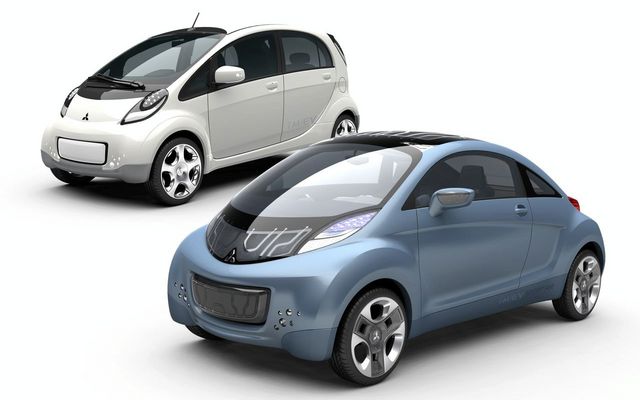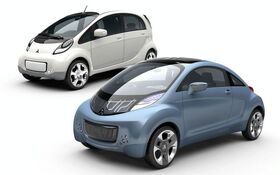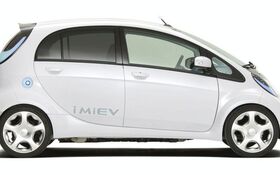Mitsubishi i-MIEV Prototype and i-MIEV Sport Air at 2009 Geneva Motor Show
Mitsubishi Motors Corporation today gave two models their global debut at the 79th Geneva International Motor Show which runs from March 3 through March 15 at the Geneva Palexpo exhibition and conference complex (opening to the general public on March 5).
The i MiEV*1 SPORT AIR concept model gives material shape to MMC's "Drive@earth" global tag-line. The prototype i MiEV concept, meanwhile, is a precursor to the electric vehicle the company will introduce on the European market in 2010.
Also among the 15 vehicles on the MMC stand is the European-built Colt Clear Tec compact model, which boasts premium green performance with CO2 emissions of just 115 g/km, as well as several other European models.
i MiEV SPORT AIR
The i MiEV SPORT AIR is a concept for a sporty electric vehicle (hence SPORT) that gives an indication of the direction EVs may take in the future. It also gives shape to MMC's "Drive@earth" tagline announcing the company's intention to deliver fun-to-drive motoring while at the same time placing a new emphasis on environmental issues. The concept model is distinguished by its detachable "clear cutaway" roof panel which brings a wide open feel to the interior (hence AIR) for an exhilarating motoring experience,other features include a second-generation lithium-ion battery module with improved electrodes, while the body uses a number of new weight-reducing technologies.
(1) Design
i MiEV SPORT AIR takes i MiEV's rear-midship platform and mounts on it a dramatic teardrop-shaped body that tapers towards the rear in a design that yields outstanding aerodynamic performance. The styling also crafts a sporty image by seamlessly integrating an extensive glazed area with the body. Other design features include the front and rear lamp units cleanly styled to produce a three-dimensional look; as well as the "clear cutaway" roof panel, designed to provide an exhilarating motoring experience. The panel incorporates a solar inlay that uses printed circuit board graphics in its design.
Inside, i MiEV SPORT AIR offers a welcoming ambience in a design that uses organic shapes and lighting to create a comfortable and restful space. The wrap-around cockpit design, on the other hand, is styled to alert the driver to the high performance potential of the car the moment he sits behind the wheel. The main controls and switches are all ergonomically grouped around the dial-type shifter, making for more positive location and operation by the driver.
i MiEV SPORT AIR features exterior and interior coloring that takes "Japanese Technology" as its theme in projecting both a friendly, approachable image and high-tech looks. The blue exterior color evokes the image of an exhilarating clear blue sky, while the use of pearl finish paint gives a sheen to the body highlights for an overall appearance that is both friendly and futuristic while also projecting an eco-friendly image. The interior uses a high-contrast color scheme of greyish blue and "greige" (an intermediate color between grey and beige.) With the use of blue illumination for the instruments and interior lighting this two-tone scheme imparts an advanced and high-tech look to the cabin while at the same time producing a relaxing and reassuring atmosphere.
(2) EV system
i MiEV SPORT AIR employs the same rear-midship layout as i MiEV but uses a more powerful version of the permanent magnet synchronous electric motor that powers the base model, generating 60 kW of power (against i MiEV's 47 kW) and 230 Nm of torque (180 Nm.) The car also exploits its long wheelbase to locate the large-capacity lithium-ion battery system under the floor deck.
(3) Body
To lower the center of gravity and increase driving stability the main EV system components (battery module, inverter, battery charger) are located as low as possible. The roof panel is made of lightweight plastic to facilitate fitting and removal as well as to further lower the car's center of gravity.
i MiEV SPORT AIR 's modular body structure uses tailgate panels and plastic body to reduce weight around the rear axle where the powertrain and EV system components are installed and thereby achieve an ideal 50:50 front/rear weight distribution. Of hybrid design, the body uses aluminum for the rear suspension and rear body.
i MiEV Prototype
(1) Design
With a view to its introduction on the European market, the prototype i MiEV features several changes compared to the i MiEV due to be introduced on the Japanese market in summer 2009. Front and rear tracks have been widened and front and rear overhangs have been extended to provide the higher levels of pedestrian protection expected in Europe as well as better occupant protection in the event of a rear-end shunt. The changes result in a shape that hints strongly at the vehicle's all-round stability.
The interior design features simple, clean styling and with a dial-type shifter and extensive use of circular shapes for the air vents and other elements, creating a welcoming interior space.
The snow-white body and ice-blue interior color derive from a "glacier" theme that was designed to evoke a strong ecological image. The printed circuit board pattern used in the surfaces and motifs adds a high-tech look to the interior.
(2) Propulsion system
The prototype i MiEV, like i MiEV, uses a unique rear-midship layout which in a gasoline-fueled car places the engine just in front of the rear wheels. In the prototype i MiEV the engine and fuel tank found in an engine-driven vehicle are replaced by the electric motor, inverter, lithium-ion battery module and other EV system components.
The rear-midship layout offers several merits including a long wheelbase that provides more interior space. In addition, the location of the heavier EV system components under the floor deck lowers the center of gravity and realizes greater vehicle stability at higher speeds.












